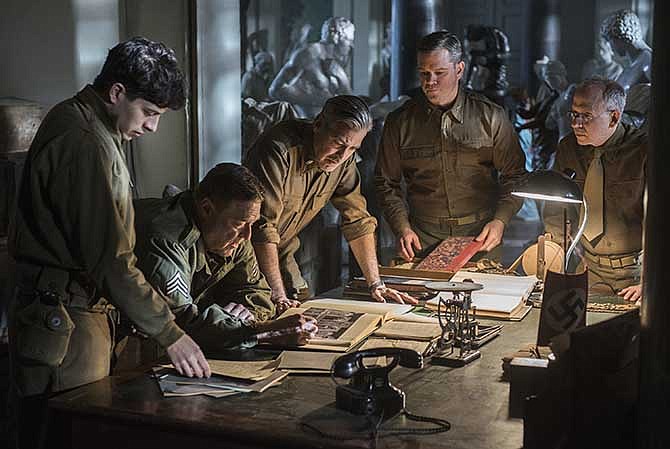George Clooney, movie director, started out with so much promise.
He began with two stories about television's power, both to distort reality ("Confessions of a Dangerous Mind" about "Gong Show" host Chuck Barris) and to reveal it ("Good Night, and Good Luck," about Edward R. Murrow). Neither was perfect, but the films showed tremendous potential, particularly the latter, with its thick clouds of paranoia and cigarette smoke.
But Clooney has gone somewhat astray, with the football comedy "Leatherheads," the political thriller "The Ides of March" and now "The Monuments Men." They're not bad pictures, but nostalgia - made urgent in "Good Night" - suffocates the World War II caper "The Monuments Men" like it did the screwball ode "Leatherheads."
Clooney's taste is very good, and in adapting Robert M. Edsel and Bret Witter's book by the same title about the Allied forces' pursuit of art masterpieces stolen by Nazis, he has chosen a fascinating historical tale that also bears the intriguing question: What's the price we're willing to pay for art?
But while a Michelangelo may be worth dying for, "The Monuments Men" is, at best, adequately priced as a movie ticket. Clooney, working from a script he penned with his frequent collaborator Grant Heslov, has fashioned his film as a traditional WWII flick, with a "Great Escape"-like score by Alexandre Desplat and a sentimental kind of soldierly chumminess.
Only this band of brothers is more like an assembly of academics. A handful of museum curators and art experts have been gathered by art historian Frank Stokes (Clooney) to investigate and retake the troves of artwork the Nazis have stolen for a mammoth German museum planned by Hitler.
The platoon is ill-suited for war but bold in spirit: an art restorer (Matt Damon), an architect (Bill Murray), a sculptor (John Goodman), a British museum head (Hugh Bonneville), a theater producer (Bob Balaban) and a French painting instructor (Jean Dujardin). Some of the pairings are fitting: Clooney and Damon planning another heist ("Ocean's Thirteen"); Dujardin and Goodman back on speaking terms ("The Artist").
In truth, more than 300 Allied servicemen and women worked in the Monuments, Fine Arts and Archives program in the final years of the war. They helped lead to the recovery of about 6 million objects (estimates vary). Most of the names in the film have been changed, and the mission has been made significantly more romantic.
Cate Blanchett plays a reluctant-to-cooperate assistant curator from Paris' Jeu de Paume museum. A book by real-life Rose Valland inspired John Frankenheimer's 1964 film, "The Train," with Burt Lancaster. It portrayed the French Resistance effort to derail a train of stolen art taken from the Jeu de Paume. With the cunning of sabotage and the soot of the train yard, "The Train" makes a more superior and grittier film.
"The Monuments Men" is instead weighed down by dutifulness. It feels like it's only a third act, lacking any buildup of tension or character development. When Stokes solemnly argues early in the film about risking life for the recovery of what he calls "the foundation of modern society," the movie has presented its thesis statement, and settled any debate. Though deadly encounters follow, the nobility of the quest is unchallenged.
With this film, Clooney (who enjoys a self-satisfying scene telling off a Nazi) has erected a stiff monument, a worthy if undramatic tribute to those it's based on.
One wishes the movie had arrived 11 years earlier. Maybe it would have raised enough awareness to take precautions ahead of the toppling of Saddam Hussein, when Baghdad's Iraq museum was looted of thousands of antiquities.
"The Monuments Men," a Columbia Pictures release, is rated PG-13 by the Motion Picture Association of America for some images of war violence and historical smoking. Running time: 118 minutes. Two and a half stars out of four.
Related video:

